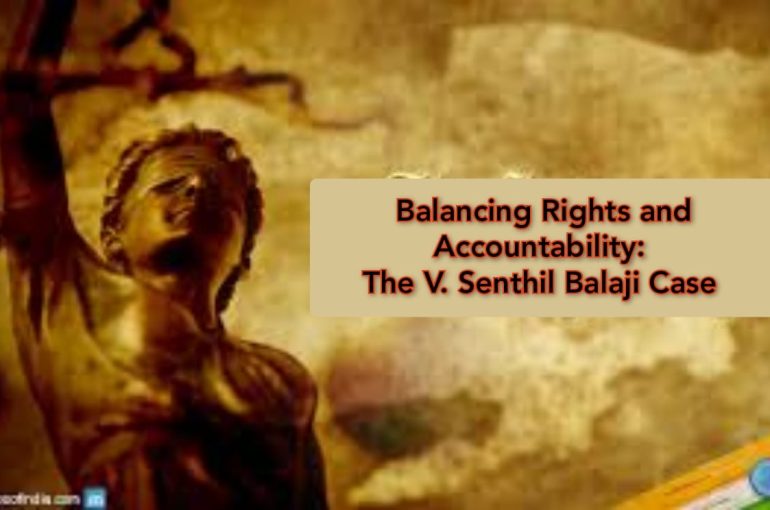Balancing Rights and Accountability: The V. Senthil Balaji Case
- Senthil Balaji v. The Deputy Director, Directorate of Enforcement (2024 IN SC 739)
As the Indian judicial system grapples with high-profile criminal cases, the role of the judiciary, particularly the Constitutional Courts, in addressing the complexities of corruption and abuse of power has become increasingly relevant. The case of V. Senthil Balaji, a former Transport Minister in the Government of Tamil Nadu, highlights the intricate interplay between political influence and the challenges faced by the judicial process
Introduction
The case of V. Senthil Balaji, a former Transport Minister in the Government of Tamil Nadu, highlights the intricate interplay between political influence, bureaucratic hierarchies, and the challenges faced by the judicial process.
The Supreme Court of India’s judgement in V. Senthil Balaji v. The Deputy Director, Directorate of Enforcement (2024 INSC 739) decided by a Bench of Two Judges J. Abhay S Oka and J. Augustine George Masih, is emblematic of the broader challenges facing the Indian legal system, particularly in cases of high-profile corruption. This case illuminates significant issues related to the Prevention of Money Laundering Act (PMLA) and the fundamental rights guaranteed under the Indian Constitution, particularly the right to a speedy trial. As the judiciary navigates the complexities of political influence, systemic corruption, and individual rights, this ruling emphasised the delicate balance that must be maintained to uphold justice.
Facts
Senthil Balaji, who held the position of Transport Minister in Tamil Nadu from 2011 to 2016, was embroiled in serious allegations of corruption. Reports indicated that he, along with his personal assistant and brother, operated a job racket in the Transport Department, allegedly collecting substantial bribes for job placements.
The allegations culminated in the registration of multiple First Information Reports (FIRs), naming over 2,000 individuals and involving approximately 550 witnesses. The Enforcement Directorate (ED) launched an investigation based on these FIRs and filed an Enforcement Case Information Report (ECIR) under the PMLA, focusing on Balaji’s purported involvement in money laundering linked to corrupt practices. Balaji was arrested on June 14, 2023, and his bail applications were subsequently denied by the Madras High Court.
Court Proceedings and Judgment
The Madras High Court’s decision in the case of V. Senthil Balaji focused on serious allegations against him, particularly his involvement in a job racket. The Court looked closely at the charges under the PMLA. It decided to deny Balaji bail, emphasising the seriousness of the accusations. The Court pointed out that Balaji’s actions not only involved large amounts of money but also affected many people who were looking for jobs in the Transport Department.
One major concern for the Court was the possibility of witness tampering. Given Balaji’s influential position as a politician and his current role as a Member of the Legislative Assembly (MLA), the Court worried he could interfere with the investigation if released. The case was complicated, with multiple FIRs and many co-accused and witnesses involved. The Court felt that serious allegations required strong measures to protect the judicial process.
By rejecting the bail application, the High Court aimed to ensure accountability in corruption cases while preventing Balaji from undermining the judicial proceedings. This ruling set the stage for Balaji’s appeal to the Supreme Court.
Supreme Court Judgment
Upon appeal, the Supreme Court undertook a comprehensive review of the case, carefully weighing the submissions from both sides:
The Supreme Court’s judgement in this present case marked a critical intervention in addressing the complexities surrounding high-profile corruption cases under the PMLA. After reviewing the arguments presented by both the prosecution and the defence, the Court emphasised the need to balance the seriousness of the allegations with the rights of the accused, particularly the right to a speedy trial in Article 21 of the Indian Constitution. The Court acknowledged the substantial evidence presented by the ED, which included electronic communications and financial records, but also recognized the potential for significant delays in the trial process due to the sheer scale of the case involving over 2,000 accused individuals. While the Madras High Court had previously denied bail citing the gravity of the accusations and the risk of witness tampering, the Supreme Court granted bail to Balaji under stringent conditions, including a ₹25 lakh financial bond and prohibitions against contacting witnesses. This decision underlined the judiciary’s role in ensuring that fundamental rights are upheld, even in cases involving serious criminal allegations, and highlighted the urgent need for reforms to expedite trial processes in complex cases to restore public confidence in the justice system.
Legal Precedents and Implications
This judgement highlights how important individual rights are, even when someone is facing serious accusations. The Supreme Court pointed to earlier cases that stressed the need to balance the idea that a person is innocent until proven guilty with the seriousness of crimes under strict laws like the PMLA.
The ruling also called attention to the need for changes in the legal system to deal with delays in high-profile corruption cases. This is important for keeping public trust in the justice system. It emphasises that having timely trials is a basic right, showing that the Courts play a crucial role in protecting people’s freedoms while also making sure there is accountability for wrongdoing.
Conclusion
The Supreme Court’s ruling in this present case marks a significant development in the interpretation of the PMLA and broader criminal jurisprudence in India. By granting bail under stringent conditions, the Court reaffirmed the principle that while serious allegations of corruption must be rigorously addressed, the fundamental rights of individuals including the right to a speedy trial cannot be compromised.
Shikha
Associate
The Indian Lawyer & Allied Services





































Leave a Reply